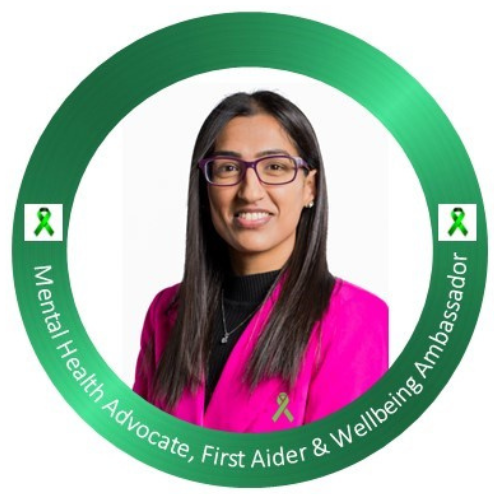by Sandeep Saib
Trigger Warning: Suicide, body image, eating disorder
I am Sandeep Saib (she/her) and I am a Lived/Living Experience (‘Expert by Experience’) Mental Health Advocate, Philanthropist and Public Speaker. I really emphasise the ‘living’ in that title, because I am still going through my own mental health journey – even whilst you are reading this.
Professionally, I am currently working as a Senior Business Development Executive at CMS where I am also a Member of the CMS Health and Wellbeing Committee & Network and a Wellbeing Ambassador.
I am delighted to share my mental health journey with you.
I am from Ilford in Essex/East London and I’m part of a big family/household. The beauty of our Sikh faith and culture is our commitment to family, and family is and has always been my backbone and a big source of support for me for as long as I can remember.
My mental health journey started when my family and I moved house for the first time in July 2012. At the time I was in my early 20s and I was beginning to move on to higher education.
I began to ruminate on what physical activity I could do to become fitter, and I started jogging here and there. It quickly became an activity I did every day, 24 hours 7 days a week. And even that was not enough for me. I started to exercise in my own room too. I kept going even when my trainers were worn in and even when I sprained my ankle – I just kept on going. No ifs, no buts. The fear of guilt, outdoing and competing with myself and others kicked in. I was not about to stop.
Then the controlling behaviour and rituals began to emerge. I kept a food and weight diary, and I used controlling behaviours like eating food only from certain bowls and with certain utensils. I was constantly mirror-gazing, weighing myself every day, calorie-counting, counting my bones/ribs, visualising what I ate – the list goes on.
Most of the time, I starved myself and lost drastic amounts of weight.
I had anger outbursts, and I started withdrawing from the world. I stopped wanting to see my family and stopped absolutely everything that I had a passion for. In my culture turning up to family events is very important and shows who you are as an individual – but I was losing myself. I felt that I was becoming something that I did not like. I didn’t want to be selfish, but I felt that I was becoming so. And that was my life for two years – until my dad noticed something was wrong.
He sat me down with my mum and he said, ‘We are worried about you.’ And he asked, ‘How are you? How are you really feeling?’
I think this is the moment my bubble popped. I realised that what I was doing was having an external impact on my loved ones, that they could see something in me and were desperate just to help and support me. And that point, we did not know what mental health was – this was alien to us.
My parents then suggested a doctor’s appointment to me and I went along and did it – for them. The doctor diagnosed me with Anorexia Nervosa (a type of eating disorder), Body Dysmorphic Disorder (BDD) and Obsessive-Compulsive Disorder (OCD) – which underpins those diagnoses, and I was also put on anti-depressants and referred to 6 sessions of Cognitive Behavioural Therapy (CBT) right away.
Therapy was the most daunting experience. It is a simple concept but back then I did not know where to start. Yes – I feared being judged or saying the wrong thing, but I began to slowly but surely open up.
Why was I punishing my body? Being so self-critical? Allowing this monster, this bully in my life to take over me and ruin me for the worst?
I began to peel these core beliefs back like an onion and came to the general consensus that it was that I felt that I wasn’t normal, that I wasn’t right or perfect or beautiful or thin but bigger than that.
I also realised that some parts stemmed back to my childhood. I had these problems and thoughts since I was 3 or 4 years old but it had only been exacerbated over the years – during my early teens, through my adult years and to the present day. I had negative comments and name-calling, which stuck to me like a leech to this day. I will always remember their words. Words hurt.
Alongside therapy and taking medication, I began to slowly “relax” my mind and body so when therapy stopped, my weight was beginning to creep up. I began to self-consume guilt and being a burden to myself and to others.
On Friday 29th August 2014, it was the day before my brother’s birthday and my family planned to go to the Gurdwara (temple, the place of worship for Sikhs) to prepare for the day. I remember waking up that very morning with a dark cloud over me – feeling so depressed and lonely. My mum came to my door and told me to come, if not for myself but for my brother’s sake. I was mentally exhausted. When I arrived, I looked to the left and right of me and realised everyone here had a purpose and that then led to me thinking more broadly as to what my purpose is/was. I quickly realised that I needed to remove myself from the situation at hand and the world.
That is when I resorted to taking my own life and tried doing so in the washrooms of the Gurdwara.
I had two conflicting voices in my brain: the ‘angel’ and the ‘devil’. The ‘angel’ told me that you are loved, that my family wanted and needed me; and the ‘devil’ told me that I had become a burden to them, that I didn’t deserve to live or breathe in this world anymore. Tears streaming my face, all I wanted and needed was for the pain to stop, the pain to end – once and for all. The moment, the feeling felt never-ending.
I remember hearing my mum – she was calling out to me, but I was so deep in this thought process that I couldn’t respond – I was numb. But I heard her voice – it slowly got louder and louder than the ‘devil’ voice. My mum approached my cubicle. I focussed on her voice more and more, then eventually slowly stopped, composed myself and opened the cubicle door. There were no words – she instantly knew what I was trying to do. We headed home as a family straight away, and I started private therapy right away. It was again fearful and challenging, but to move forward you have to go backwards. I was adamant in wanting to get better and I started to unpick and explore my thoughts, and my behaviours and challenge those negative thoughts and emotions. In 2014, I finally had the call from NHS Secondary Psychological Care to start 40 sessions of therapy so I proceeded with it.
2016 was a positive turning point in my life. And I love talking about this point.
My life changed.
I am a firm believer that everything happens for a reason – that God kept me alive to go on to try and help others and become a missionary.
That is exactly what I did.
Mental health advocacy is my way of life, my way of being – now and forever. I will never stop.
Mental health charity and advocacy became my form of therapy. Helping others helps me – as cliche as that sounds. It is a privilege to use my voice and I think the power of storytelling is unbelievable.
I have been thinking about the struggle to quantify the impact that I am actually making and I have come to the conclusion that the way to do this is by always listening to and obtaining feedback. Countless numbers of people here in the UK and internationally have reached out to me after I did a mental health project initiative, such as coming across my ‘Breaking the Silence – The Angel and The Devil’ documentary film, reading an editorial/blog piece, listening to a podcast and/or speaking at an event – and that’s the only way I know that I am making a difference – the collective feedback from individuals seeing and listening to me on various platforms globally. Knowing that I have helped someone to know and understand more about the world of mental health, to either help themselves or others, is priceless to me. This is why I do what I do.
As a person of colour and a woman, I am also always directing my mental health advocacy efforts from a multifaceted identity, so talking about inclusivity, equality, equity and diversity in the world of mental health is paramount to me – independently but also collectively with fellow advocates, organisations and charities – to combat stigma and discrimination for the better.
I also wear other hats in the mental health space – I volunteer for Samaritans Redbridge Branch as a Support Volunteer, Mind Charity’s Media Volunteer & Lived Experience Influencer and Rethink’s Committee Member and National Suicide Prevention Alliance (NSPA)’s Lived Experience Influencer – to name a few.
As I write this, I am struggling again but it is truly the combination of advocacy work (such as writing this blog for you), my family and my faith which is keeping me grounded, empowered and motivated. Also, as a Sikh, I have learnt that we need to aspire to maintain a mental state of eternal resilience, optimism, and joy; an acceptance that life ebbs and flows with hardship and to rise above that adversity – this is truthfully reflected in the world of mental health today and forever.
In terms of my own mental health, here are a few tips/advice:
- Talking is important – because it allows us to express our thoughts and emotions. We talk about physical health, but mental health still isn’t talked about in the same light – probably because people can’t see it. Talk every day and we must also remember to actively listen. Listening is really powerful. I really do think it is at least 80% listening vs. 20% talking.
- Find a space where one can open up – I always try to find time and space in my day for mental health conversations. As I work full-time, I mostly do this in the workplace – at CMS. But it can be challenging to find a space to talk about mental health in the office because the day flies by. We’re all so busy getting our heads down in work that it’s hard to press pause and be real sometimes. I find that arranging a coffee, a walk outside, going to lunch or even arranging a virtual Teams/Zoom call with colleagues is the best way for us to check in with each other. It helps to find a space like that where it’s easier to have a frank talk and open up.
- Sharing positives and negatives – as I have said, family support is the most important because my mental health directly impacts those close to me. So, with my family, checking in with them via our WhatsApp Group is usually what works best. But we also make dedicated time to chat in person. Once a month we get together at a café after visiting the Gurdwara and have what we call a ‘family trust circle. We do it outside the house so there are no distractions, and we go through how we are feeling – one by one. It is a great place for open communication and early intervention – for us all to help one another and be there for each other. We understand and respect each other a lot more.
- The power of journaling – as and when a thought comes to you, write or jot it down somewhere and date it as soon as you can so you have a record of your feelings, emotions and thoughts on a given day. You can then look back, read/review and use it as building blocks to plan and move forward. Try and look forward to the future, not back to the past.
- Have a hobby/interest that is you – I’ve taken up dancing as a hobby/interest to mine. This has replaced jogging and running which I realised I did not enjoy anyway. Dancing is something that I am passionate about, along with listening to music and singing – really relaxes me and resonates with different parts of my recovery journey.
- Be sure to eat right and get the sleep you need – the power of food and nutrition is key to one’s overall mental health. So be sure to eat the right type of foods for you, take in those vitamins/supplements and have enough sleep to recharge and reset, ready to take on the day ahead.
- The art of ‘being’ and ‘presentism’ – I am not one to fully absorb myself in thinking mindfully as I find that quite challenging at times therefore, I have to put more effort into it. So I find that if I find a quiet room, put my hand on my heart, hear my heartbeat, close my eyes and go through all the 5 senses, one by one, helps centre me. Wearing earphones/plugs helps, to block out any external sounds.
- The importance of faith and self-faith – for me, my faith and culture are integral for me as they allow me to reconnect with myself, get in touch with my five senses and meditate mindfully. Alongside this, we need to also have self-faith in ourselves as well – think more positively, be optimistic and have hope that we CAN get through it and help IS there for you.
- Mental health is everyone’s business, and we need to talk about it – try and share as much as you can – whether it is sharing your story on platforms, your feelings in a 121 or helping a loved one. You are never defined by your diagnosis but by how to use your experience to proactively empower yourself and others along the way. So please keep talking about mental health – all day, every day – and bring others with you on the ride up.
It is important for everyone to remember, that relapse is a normal and often an expected part of the recovery journey, but it doesn’t mean you’ve failed. Each setback is an opportunity to learn, grow, and continue moving forward towards a brighter future.
To you reading my blog, thank you and I wish you all the very best with your mental health. Keep going – you are loved and appreciated and I am right behind you cheering you on.
You can find out more about Sandeep and follow along with her journey here.



